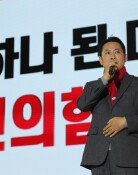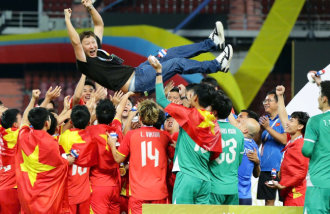Sino-S.Korean hotline
After the death of North Korean leader Kim Jong Il, President Lee Myung-bak held talks with his counterparts in the U.S., Japan and Russia. His hotline with Chinese President Hu Jintao failed to work, however. The power vacuum caused by Kims death is critical in that it could lead to a sudden change in the North. South Korean and Chinese foreign ministers discussed the issue a day after Kim`s death, but the failure of the hotline reflects the sluggish nature of the diplomatic channel between the two countries.
In their May 2008 summit, Lee and Hu promoted bilateral relations from a "comprehensive cooperative" partnership to a "strategic cooperative" partnership, implying that both sides could meet immediately in case of a problem. Beijing promised joint efforts for peace and safety on the Korean Peninsula but if it ignored Seoul`s request for a call on purpose, this is a serious diplomatic gaffe. China`s key diplomatic channels are said to have turned off their phones on the day of Kim`s death and did not respond. How irresponsible China is given that Beijing is the chair of the six-party talks on getting North Korea to give up its nuclear program.
Though Beijing is tied to Pyongyang by blood, it should show support for its comprehensive cooperative relationship with Seoul. Hu did not phone his American, Japanese and Russian counterparts, but should have treated President Lee differently because South Korea is directly involved in inter-Korean relations. Hu ignored South Korea while visiting the North Korean Embassy in Beijing with high-ranking officials such as Vice President Xi Jinping and National People`s Congress Standing Committee Chairman Wu Bangguo to pay tribute to the North Korean leader.
It is regrettable that Beijing uses its diplomatic channel with Seoul only when it finds it necessary. After the North shelled South Korea`s Yeonpyeong Island late last year, the possibility of physical conflict between the two Koreas increased. Beijing ignored diplomatic protocol and made a sudden notice that State Councilor Dai Bingguo would visit Seoul. He showed irrational behavior by unilaterally declaring the resumption of the six-party talks.
For its part, Seoul should not make an excuse that Beijing rarely responds over the phone in case of emergency related to Pyongyang. A diplomatic hotline is an emergency tool in times of crisis in North Korea and should not break down when needed. Experts also say South Korea lacks strong leverage that can move China due to high diplomatic dependence on the U.S. Therefore, a more effective way is needed to develop Seoul-Beijing relations into a true strategic cooperative partnership in the run-up to the 20th anniversary of bilateral ties.




![넘치는 전재수 과거 사진들…유죄의 증거일까, 무죄의 증거일까[청계천 옆 사진관]](https://dimg.donga.com/c/138/175/90/1/wps/NEWS/IMAGE/2025/12/20/132997378.1.jpg)


